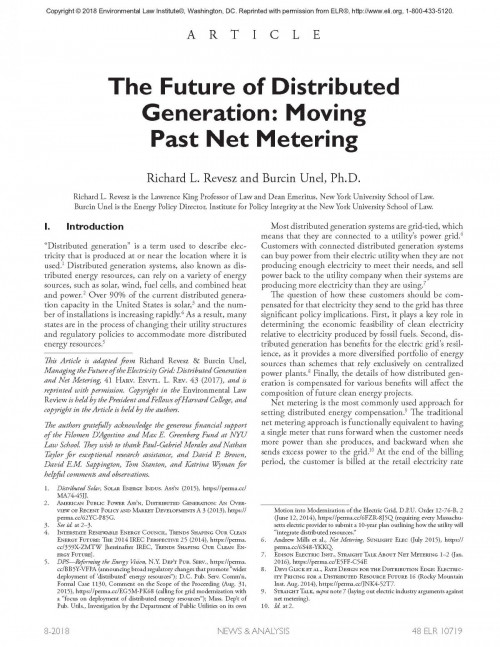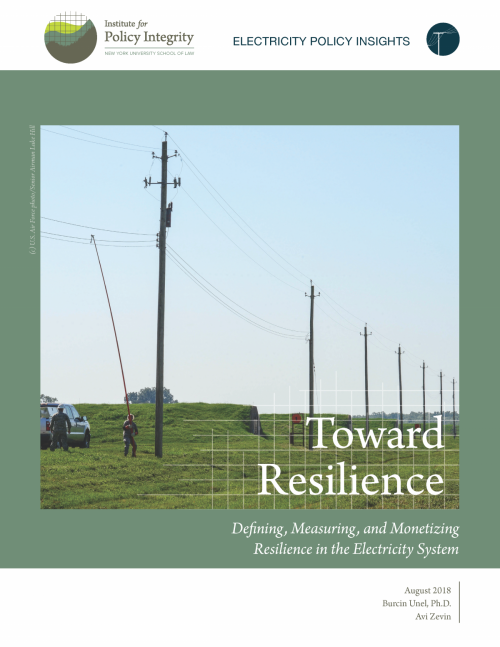-

The Future of Distributed Generation
Moving Past Net Metering
This article provides an overview of the benefits and the costs of distributed generation and highlights the analytical flaws and missing elements in the competing positions and in most existing policies. We propose an alternative approach that recognizes the contributions to the electric grid of both utilities and distributed generators. The article is excerpted and revised from a longer academic article, “Managing the Future of the Electricity Grid: Distributed Generation and Net Metering,” which was selected by Environmental Law Reporter as one of the five best environmental law articles published in the 2017-2018 academic year.
-
Comments to Interior on Offshore Oil Well Control Revisions
After the Deepwater Horizon explosion and oil spill, the Department of the Interior’s Bureau of Safety and Environmental Enforcement (BSEE) issued regulations designed to improve the safety of offshore drilling operations. Finalized in 2016 after six years of extensive public involvement, these safeguards are now in the process of being rolled back by BSEE. Our comments to BSEE argue that it should not move forward with its notice of intent to repeal and/or modify the Blowout Preventer Systems and Well Control Rule, because BSEE has not provided a reasoned explanation for weakening and repealing safety requirements that it found necessary in 2016. BSEE must analyze all of the forgone societal benefits from rolling back the finalized safeguards, including safety and environmental risk reduction, time savings, industry cost savings, reduced fatalities, and lower externality costs.
-

Toward Resilience
Defining, Measuring, and Monetizing Resilience in the Electricity System
Grid resilience—generally, the electric grid’s ability to resist/absorb, manage, quickly respond, and recover from/adapt to high-impact, low-probability external shocks—has been a concern for electric utilities and energy planners for decades. While recent extreme weather and cyber security concerns have prompted the federal government to pursue policies that support coal and nuclear power plants, a more systematic focus on resilience will lead to very different solutions than what has been proposed by the Department of Energy. Our report aims to assist policymakers in understanding grid resilience and evaluating potential interventions aimed at improving grid resilience.
-
Comments to the Nevada PUC on the Proposed Regulation to Implement SB 65
The Nevada Public Utilities Commission recently released a proposed regulation to implement Senate Bill 65, which directs the PUC to give preference to those measures and sources of supply that provide the greatest economic and environmental benefit to the State. In our joint comments with Western Resource Advocates and Environmental Defense Fund, we express our support for these revisions to Nevada’s resource planning regulations. Specifically, we support the Commission’s application of the Interagency Working Group (IWG) Social Cost of Carbon (SCC) estimates to calculate the Present Worth of Societal Costs in Nevada, as reflected in the proposed regulation. In addition, we update the PUC on the use of the IWG SCC estimates in other states, including California, Colorado, Minnesota, New York and Washington State.
-
Comments on FERC’s NOI on the Certification of Interstate Natural Gas Pipeline Facilities
In April 2018, the Federal Energy Regulatory Commission (FERC) issued a notice of inquiry on how to revise its policy on certifying the construction and operation of interstate natural gas transportation facilities. In the nineteen years since FERC’s existing policy statement was released, there have been significant advances in the understanding and measurement of climate change and other environmental effects of natural gas production, transportation, and consumption. Our comments suggest clarifications and improvements to FERC’s NEPA and Natural Gas Act analyses that will better inform policymakers and the public about the environmental effects of proposed projects. We also submitted joint comments on the appropriate use of the social cost of carbon in the interstate natural gas facilities certification processes, including why and how greenhouse gas emissions should be monetized in FERC’s NEPA and Natural Gas Act analyses.
-

How States Can Value Pollution Reductions from Distributed Energy Resources
DERs are a growing part of the U.S. electric system and many state electric utility regulators are looking to more accurately compensate them by paying for a variety of the benefits that these resources provide. Most states are currently focusing on energy and distribution-level benefits, but this approach overlooks the environmental and public health impacts of DERs. Even though some states like California and New York have been working on analyses that include environmental attributes of DERs, few regulators have attempted a thorough evaluation of the environmental and public health benefits. Our report, Valuing Pollution Reduction, lays out a practical methodology for calculating the E value, the highlights of which are captured here. Specifically, this issue brief describes how to appropriately value environmental and public health benefits by monetizing the economic, health, and climate damages avoided emissions would have caused. State utility regulators can use the steps described here, weighing tradeoffs between accuracy and administrability, to implement their own program to holistically compensate DERs.
-
Comments to FERC on Seasonal Capacity Markets and Electricity Demand
PJM Interconnection (PJM), the electric grid and wholesale market operator in 13 states and Washington D.C., currently has a market design that leads to over-procurement of electric generating capacity, particularly from generation resources that are able to provide capacity throughout the year. This inefficient market design raises capacity costs and suppresses the participation of resources, such as wind, solar, and natural gas, whose generating capacity varies by season. The Federal Energy Regulatory Commission (FERC) recently held a technical conference to seek feedback on how PJM can redesign its capacity market to better facilitate participation of these seasonal resources. Our comments to FERC argue that replacing or supplementing the current annual-only capacity product with seasonal capacity products would improve the efficiency of the PJM capacity market. In addition, we suggest changes in the capacity market participation rules for wind, solar, and other intermittent resources.
-
Environmental Value of Distributed Energy Resources for New York State - Subgroup Report
New York State is seeking to refine its method for compensating distributed energy resources (DERs) based on the value that they provide, including their potential to reduce local air pollution and greenhouse gas emissions. Together with a group of government agencies, non-governmental community and environmental organizations, academic centers, and clean energy businesses, we submitted a report that describes the work of an informal, stakeholder-led Environmental / Environmental Justice Value Subgroup, which was formed to identify methods for calculating the environmental and public health value of avoided air pollution caused by DER injections in New York State. As part of that filing, we also submitted our report, Valuing Pollution Reductions, which serves as a general guide for state regulators interested in calculating the environmental and public health value of avoided air pollution caused by DER injections.We also presented the results of this report to NYS DPS Staff.
-
Comments to Interior on San Juan Mine Lease Extension DEIS (New Mexico)
The Department of the Interior is proposing to extend leasing and operations at New Mexico’s San Juan mine by 15 years, producing up to 53 million additional tons of coal that will release 97.5 million tons of greenhouse gas emissions when combusted. In our comments to Interior on its draft environmental impact statement (DEIS) for the mine’s lease extension, we criticize Interior’s failure to fully account for the climate effects related to the project by monetizing the damage these emissions will cause. This refusal leaves the public and decisionmakers in the dark about the climate effects of the project, and is arbitrary given that the agency relies on the project’s monetized benefits to justify its action.
-
Brief on Repeal of Interior’s Valuation Rule
In 2016, the Department of the Interior’s Office of Natural Resources Revenue (ONRR) issued the Consolidated Federal Oil & Gas and Federal & Indian Coal Valuation Reform (Valuation Rule). The Valuation Rule sought to ensure that states and the federal government receive the full value of royalties due under the law for oil, gas, and coal extracted from public land. In 2017, ONRR abruptly reversed course and repealed the rule. State attorneys general have now sued ONRR over the repeal and filed a motion for summary judgment. In our brief supporting the plaintiffs, we argue that ONRR did not provide a reasoned explanation for repealing the Valuation Rule, both because ONRR fails to accurately assess the repeal’s economic impact and because ONRR fails to provide a reasoned explanation for its abrupt change in course.
Viewing recent projects in Climate and Energy Policy






